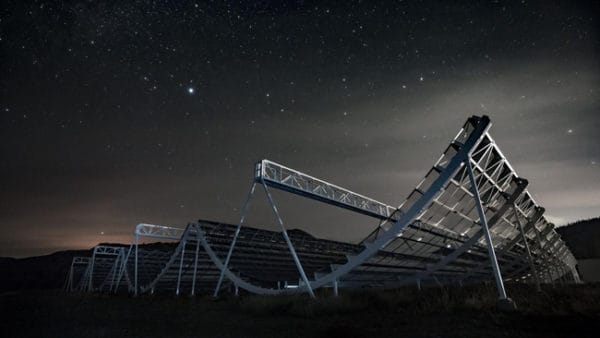
 It’s a red letter day for Canadian science, as the CHIME radio telescope, a project five years in the making, is finally up and running.
It’s a red letter day for Canadian science, as the CHIME radio telescope, a project five years in the making, is finally up and running.
The result of a collaboration between 50 scientists at McGill University, UBC, the University of Toronto and the National Research Council of Canada (NRC), CHIME —short for Canadian Hydrogen Intensity Mapping Experiment— intends on acting as a time machine to peer into the history of the universe and hopefully shed further light on one of the more perplexing questions facing cosmologists: why is the expansion of the universe speeding up and not slowing down?
Situated at the NRC’s Radio Astrophysical Observatory near Penticton, BC, CHIME consists of four 100-metre long half-cylinders of metal mesh, altogether about the size of five hockey rinks. Unlike other telescopes which need to be focused on area of the sky at a time, CHIME and its 2,000 radio receivers can take in data from the whole overhead sky at once and then use massive computing power to integrate the information into one comprehensive 3D map of the universe.
“It looks at a north-south strip and, as the Earth turns, it scans the sky,” Dr. Mark Halpern, professor of astrophysics at UBC, to the Globe and Mail.
As its name implies, CHIME will be using radio waves to detect hydrogen gas which floats around in the almost-empty regions of outer space. Most of the information that CHIME will collect will be from our Milky Way galaxy, but a portion will come from radio waves from further afield — six to 11 billion years ago, in fact.
The aim is to search for variations in hydrogen volumes as an indication of how the distance between galaxies has changed over time, particularly with reference to the period between six and 11 billion years ago when, according to astronomers, the expansion of the universe began to speed up.
The project includes a $16-million investment from the Canada Foundation for Innovation and from the governments of BC, Ontario and Quebec and the Canadian Institute for Advanced Research.
“CHIME is an extraordinary example showcasing Canada’s leadership in space science and engineering,” said Kirsty Duncan, Federal Minister of Science, who was on hand yesterday for the unveiling. “The new telescope will be a destination for astronomers from around the world who will work with their Canadian counterparts to answer some of the most profound questions about space,” said Duncan.
The accelerated expansion of the universe was first discovered in the 1990s when scientists studying supernovae concluded that rather than decelerating (which was thought to be the case, based on what we know about the Big Bang and how gravity functions), the expansion was speeding up.
While it remains unclear why universal acceleration is occurring, experts think that dark energy, that still mysterious force which scientists believe makes up about 68 per cent of the energy in the universe, is to blame, as it’s theorized to counteract gravity’s pull.
The data from CHIME will be used to draw further conclusions about dark energy, along with providing insight into gravitational waves, another recently-discovered feature of the universe.
Leave a Reply
You must be logged in to post a comment.




 Share
Share Tweet
Tweet Share
Share




Comment